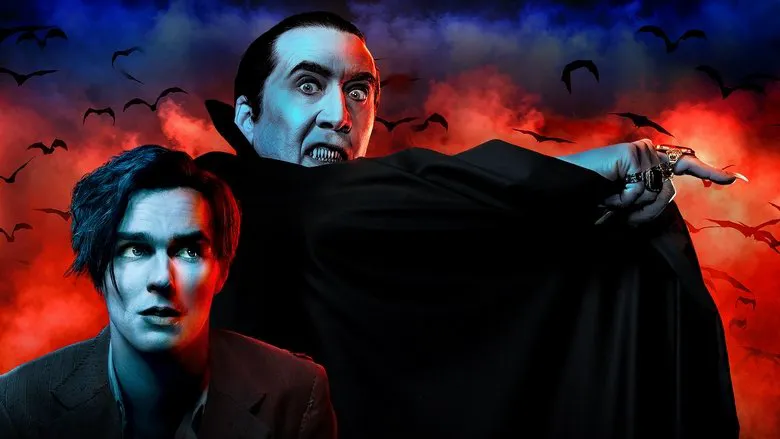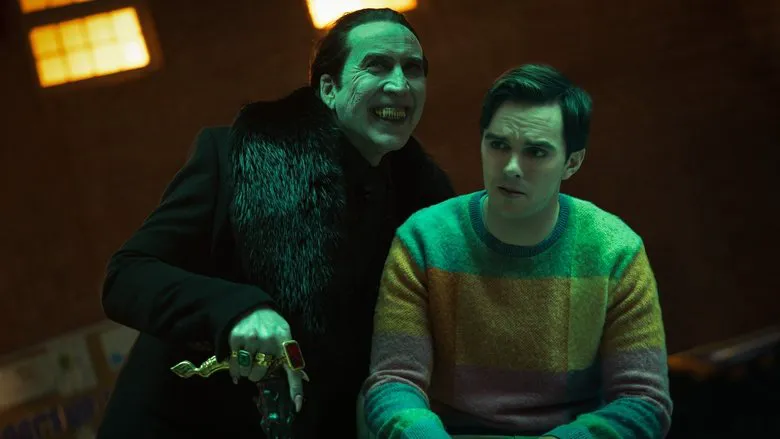Treating Psychological Trauma in the Setting of Bram Stoker’s Novel
In the early twentieth century, the infamous Transylvanian Count Vlad Dracula (Nicolas Cage) lures the naive English lawyer R.M. Renfield (Nicholas Hoult) to his gloomy castle, captivates his mind with vampiric charm, and turns him into a submissive servant. For the next ninety years, Renfield faithfully serves his immortal master, neglecting his personal life. Everything changes when the characters move to New Orleans, where Renfield discovers a 12-step psychological support program for people in co-dependent relationships.

Bram Stoker’s “Dracula” is one of the most adapted novels in the history of modern cinema, shaping the classic image of a vampire in the public consciousness: an authoritative, cruel, and cold-blooded killer. Over the decades, this image has successfully evolved: the pale monster from “Nosferatu: A Symphony of Horror” slowly but surely transformed into a sexy gothic prince with dictatorial tendencies. By the 2010s, screen vampires had completely lost all their bloodthirst, turning into the plush vegan Cullens – characters from the popular teen franchise “Twilight.”
The Modern Vampire: A Reflection of Co-dependency
In the 2020s, as psychology has finally ceased to be considered a pseudoscience, the image of the nocturnal bloodsucker from the novel of the century before last resonates less and less with gothic horror and more and more with reality. Few people are surprised by the concept of “energy vampirism” now, but in the context of Stoker’s storyline, it seems to be used for the first time. Based on the eponymous story by Robert Kirkman (“The Walking Dead”), “Renfield” not only shifts the main focus of the narrative from the charismatic Transylvanian Count to his seemingly unremarkable servant but also reinterprets the mythology of vampirism from the perspective of a narcissistic abuse victim.

Renfield’s character perfectly fits the symptoms of a person withering in a painful co-dependent relationship, while Dracula himself behaves like a typical manipulative sociopath, keeping his victim on a leash of threats, gaslighting, and physical abuse. Renfield is helped to see the dark side of his beloved master (and himself) by stepping out of his comfort zone when he saves, rather than takes, the life of an innocent person for the first time – the brave policewoman Rebecca, played by Awkwafina. Renfield feels that he has done something truly worthwhile, after which he decides to follow the classic hero’s path.
From Psychological Insight to Over-the-Top Action
Paradoxically, from this moment on, the film gradually loses all its charm and appeal: the intricate concept of vampirism is replaced by excessive, sometimes uncomfortable action. Director Chris McKay (“The Tomorrow War”) hyper-compensates for the trash-comedy genre, staging a repeatedly recurring bloodbath with a dozen severed limbs and liters of bloody diarrhea. Watching this is tolerable, but more often than not – just tiring. “Renfield” does not stand up to comparisons with Elizabeth Banks’ recent “Cocaine Bear”: McKay’s trash clearly lacks enthusiasm and, oddly enough, imagination.
Nicolas Cage’s Unhinged Dracula Saves the Day
Fortunately, when the excessive action is put on a forced pause, a bat-like cloud with the insane grimace of Nicolas Cage appears on the screen – “Renfield” becomes interesting again. Cage, who is experiencing a revival of his acting career, is predictably hilarious in the role of his villainous majesty, next to whom Renfield himself is forever a trembling creature, albeit with a successful course of psychotherapy.